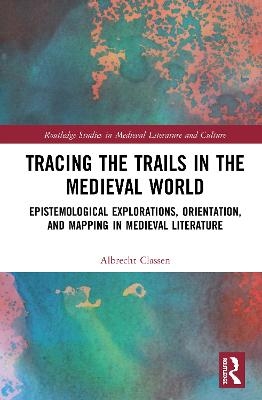
Tracing the Trails in the Medieval World
Routledge (Verlag)
978-0-367-45969-7 (ISBN)
Every human being knows that we are walking through life following trails, whether we are aware of them or not. Medieval poets, from the anonymous composer of Beowulf to Marie de France, Hartmann von Aue, Gottfried von Strassburg, and Guillaume de Lorris to Petrarch and Heinrich Kaufringer, predicated their works on the notion of the trail and elaborated on its epistemological function. We can grasp here an essential concept that determines much of medieval and early modern European literature and philosophy, addressing the direction which all protagonists pursue, as powerfully illustrated also by the anonymous poets of Herzog Ernst and Sir Gawain and the Green Knight. Dante’s Divina Commedia, in fact, proves to be one of the most explicit poetic manifestations of the fundamental idea of the trail, but we find strong parallels also in powerful contemporary works such as Guillaume de Deguileville’s Pèlerinage de la vie humaine and in many mystical tracts.
Dr. Albrecht Classen is a University Distinguished Professor of German Studies at the University of Arizona focusing mostly on medieval and early modern literature and culture.
Introduction
Epistemological Explorations, Orientations, and Mapping.
Forging Ahead - Trailing and Orientation in Medieval
and Early Modern Literature
1. Beowulf’s Ways to Denmark, to the Monster, Home Again,
and the Path to the Dragon’s Layer
2. Herzog Ernst: A Traveler Explores the Eastern World:
Herzog Ernst and His Efforts to Find Himself Through Travel.
Or: Trails through a Political Jungle and an Exotic World in the East
3. The Lovers in Their Quest for the Right Trail and
the Trail of Love: Marie de France’s Lais
4. Right Paths, Wrong Paths, Circuitous Paths, Dead Ends,
and Religious Epiphany in Hartmann von Aue’s Gregorius.
Crossroads in a Christian Narrative
5. The Passage Toward Happiness: Trailing Through the World
in Search of Love: Gottfried von Straßburg’s Tristan
(together with some comments on Walther von der Vogelweide
and Wolfram von Eschenbach).
Where There is a Trail, There is Love!
6. The Walk Through the Garden of Love in Medieval Literature,
with a Focus on Le Roman de la rose by Guillaume de Lorris.
Dreamful Trailing and Awakening with Surprises
7. Dante and the Infinite Way Down to Hell and Beyond:
Hope or Despair, Just as the Trail Takes Us
8. Petrarch’s Search for His Own Self, Climbing Mont Ventoux
Trails Leading Upwards, not Downwards
9. The Experience of the World in Narrative and Graphic Form
Trailing through a Medieval Depiction of the Entire Earth
Literary Explorations and Medieval Maps (Ebstorf) and Charts
Epilogue
| Erscheinungsdatum | 12.10.2020 |
|---|---|
| Reihe/Serie | Routledge Studies in Medieval Literature and Culture |
| Zusatzinfo | 2 Halftones, black and white; 2 Illustrations, black and white |
| Verlagsort | London |
| Sprache | englisch |
| Maße | 152 x 229 mm |
| Gewicht | 571 g |
| Themenwelt | Literatur ► Lyrik / Dramatik ► Lyrik / Gedichte |
| Geschichte ► Allgemeine Geschichte ► Mittelalter | |
| Geisteswissenschaften ► Philosophie ► Philosophie der Neuzeit | |
| Geisteswissenschaften ► Sprach- / Literaturwissenschaft ► Anglistik / Amerikanistik | |
| Geisteswissenschaften ► Sprach- / Literaturwissenschaft ► Literaturwissenschaft | |
| ISBN-10 | 0-367-45969-8 / 0367459698 |
| ISBN-13 | 978-0-367-45969-7 / 9780367459697 |
| Zustand | Neuware |
| Haben Sie eine Frage zum Produkt? |
aus dem Bereich


